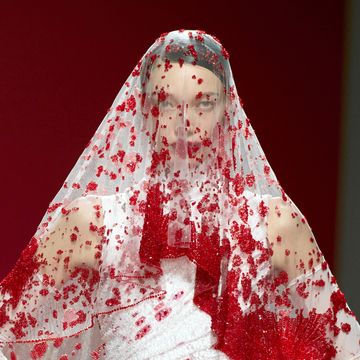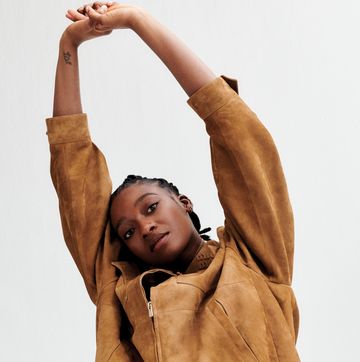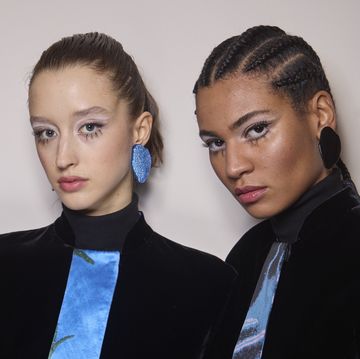The landscape by Otegha Uwagba
When was the last time you consumed art that felt like it truly reflected you? When you finished a book, or watched a TV series, that so effectively synthesised your own life – your experiences, outlook and cultural predilections – that it felt almost as though someone had created it specifically for you?
If you’re middle-class, chances are that this happens with some regularity. But for working-class Brits, that sense of uncanny resonance is vanishingly rare, possibly because – per the Office of National Statistics – the proportion of working-class creatives in the UK has more than halved since the 1970s. Though opportunities for working-class creatives in the UK have never been plentiful, these days they’re even fewer and farther between. When the Oldham Coliseum Theatre near Manchester closed after losing its Arts Council funding in March last year, Christopher Eccleston – who grew up going to see plays there – said it would be ‘impossible’ for him to become an actor today.
And our creative output – one of the UK’s greatest exports – is poorer for it. As fewer working-class actors, musicians, writers and film-makers get the chance to produce work that reflects their lives, stories with working-class narratives increasingly disappear from the mainstream. Charlotte Regan, writer and director of last year’s critically acclaimed coming-of-age movie Scrapper, has spoken of her desire to create a film centring on ‘happy and joyful’ working-class characters. There’s often considerable pressure from the (largely white, middle class) gatekeepers of industry – TV producers, or publishers for example – for the working-class stories that do make it through to conform to stereotypical ‘poverty-porn’ narratives. Then there’s the money side of things. Having parents who can pay your way while you do an unpaid internship can make the difference between persevering or calling it a day. When I graduated over a decade ago, I found that entry to many industries I was interested in – journalism, the arts – was reliant on an indeterminate period of unpaid work. Even as someone whose parents live in London, I couldn’t afford to entertain the prospect of working for free. Instead, I found a reasonably paid, chronically unfulfilling job, and manoeuvred my way into a writing career in my late twenties. These unpaid roles remain all too prevalent. A survey by the European Youth Forum in April 2023 found that 52% of respondents had done at least two unpaid internships before securing a job.
The advantages of the middle classes often extend beyond money, encompassing qualities identified as ‘skill’ or ‘intelligence’, but more often than not these are simply by-products of class. The privileged are versed in the behavioural codes and cultural references required for success, because they know the ‘right’ people and crack the ‘right’ jokes – I’ve watched col- leagues bond over experiences you’d only have had if you’d been privately educated. So what’s to be done? I often look to Ireland as an example of how change can be effected at a policy level. Its government supports creative talent through grants and funding; hence the recent boom in Irish literary talent. I take comfort, too, in the fact that working-class creatives I know are committed to sending the ladder back down – just look at Oscar winner Daniel Kaluuya’s Centre 59, a youth-theatre company created with London’s Roundhouse, aimed at replicating the free arts pro- grammes that kickstarted his own career. That the desire to pay it forward is often present in those of us not ‘to the manor born’ gives me hope.
All that remains is for people who do enjoy class privilege – who are, after all, the dominant class in this creative sector – to step up and do their part, too.
Class & film by Ellen E Jones
Is British film and tele- vision still the ‘poshocracy’ of yesteryear? It certainly was back in 2007, when Tilda Swinton (scion of an ancient Anglo-Scots family, schoolfriend of Princess Di) won the Oscar, which began her ascent to classiest – and coolest – actor on the planet. It still was in 2016, when research by the Sutton Trust found that 67% of British Oscar winners had been privately educated. By 2019, when Phoebe Waller-Bridge (landed gentry on one side of the family, baronetcy on the other) took that Insta-iconic, cig-smoking, cocktail- drinking post-Emmys pic, it seemed as if she was topping off a phenomenal run of success – both for her personally and for her entire social class.
Posh actors are possibly the most visible aspect of an inherited privilege system that permeates British society, including film and TV journalism, where I make my living. As a council estate-raised, state-educated kid, my career path has been slower and windier than my privately educated, connected colleagues, but the fact I made it here at all is down to other privileges that also need acknowledging. As a Londoner, I could live at my mum’s for the years of interning and, crucially, I got into Cambridge before tuition fees went up. Baroque sexual perversions aside, I identified with Oliver, the ambitious ‘scholarship boy’ antihero who ruthlessly ingratiates himself into the life and loves of his wealthy Oxford chum in Saltburn, the latest film by Emerald Fennell (private school, then Oxford).
Events at the end of last year seemed to entrench film’s poshocracy even further. There was the passing of Anna Scher, the beloved, influential north-London acting teacher whose 10p drama lessons made the industry accessible to generations of talented kids, including Kathy Burke and Daniel Kaluuya. It prompted the question of who will serve the just-as-talented kids coming up now, and in the future?
Happily, it’s not all as bleak as a 1960s kitchen-sink drama. This is England star Stephen Graham and his wife, actor Hannah Walters, have launched Grass Routes, an initiative to ‘help writers from socioeconomically disadvantaged back- grounds kickstart their careers’. They’ll join mentoring organisations such as Arts Emergency and the LFF Critics’ Support Fund for film journalists (I donated). These schemes can help replicate the old-boy networks that being posh provides. What they can’t do is adequately plug the gap in generational wealth.
This is what being working-class and working in film and TV often comes down to: the lack of an inheritance to fall back on. A growing frustration around inequality is increasingly influencing the work made by those in the industry. The recent run of ‘Eat the Rich’ film and TV narratives – Succession, White Lotus, Triangle of Sadness, Saltburn – has been enjoyable. But, while watching these might take the sting out of our rigid class system, they do nothing to address fundamental inequalities. Yet, it’s clear that some sort of legacy for working-class film-making does exist. It’s there in the shimmering, Terence Davies-influenced parent-child bond of Charlotte Wells’ Aftersun. It’s there in the love Raine Allen- Miller’s Rye Lane shows for south London. Most of all, it’s there in the diversity of representation that now exists for British working-class life on screen, from Aleem Khan’s After Love to Charlotte Regan’s Scrapper and Adura Onashile’s Girl.
Only time will tell if these debut film- makers will receive the same continued industry support as the likes of Emerald Fennell. In the meantime, this is what we’ve all inherited: the total, unshakeable conviction that our stories matter, too.
Class & fashion by Tori West
‘Wow, Tori, you’re doing so well at the moment; you must be loaded now,’ said a friend I ran into during London Fashion Week a few seasons ago. A ‘compliment’ that was more frustrating than flattering, due to how far removed it was from my reality. At the time, I was illegally subletting a tiny, unfurnished room in Brixton. The window was broken, in the middle of a freezing February, and I’d spent the past three months sleeping on a £20 blow-up mattress with nothing else in the room but some clothes in a suitcase. I’d lived in London for a year, but couldn’t get a lease because I had no guarantor, stable income or savings. As much as my new life in the fashion industry seemed glamorous to others on social media, I’d jumped the bus to get to that fashion show that day.
There’s a disconnect between how people perceive those working in the fashion industry and the reality. Yes, this sector trades on luxury, wealth and exclusivity. But behind closed doors, life can look less glamorous for some of us. Work opportunities are often reserved for individuals who are financially stable enough to accept them in the first place, leaving those from lower-income backgrounds to struggle to make ends meet. A few decades ago, working-class designers such as Alexander McQueen and Vivienne Westwood did manage to break through, but it’s difficult to imagine how someone from a low socioeconomic background would be able to find as much success today.
Of course, coming from a low-income background poses financial challenges, but for me, the biggest hurdle was the mental burden. When I finally landed my first editorial role at a top UK fashion publication, my home-owning colleagues would socialise every night, rock up to the office in new designer clothing and chomp down their Waitrose lunches every day. Mean- while, I was scared to leave the house for anything other than going to the office, to avoid having to spend money. I felt iso- lated and inferior, and it began to hinder my career progression. I became less vocal in meetings and would refrain from sharing ideas, believing they were insignificant. I lasted just four months.
I’ve worked in the industry for around eight years now – and that’s only because I became a full-time cleaner for two years. It was the first time I’d had a stable income while living in London, allowing me to set up a fashion publication, Bricks Magazine, on the side. We started to gain industry recognition and pick up fashion advertisers, and I eventually quit the cleaning job in 2021. One of the biggest things I’ve learned is that it was working in environments surrounded by mostly financially privileged individuals that dented my confidence, not my lack of skill. To raise working-class representation in the fashion industry, my publication prioritises hiring creatives from low-income backgrounds.
As one independent publication we are limited in how much of a difference we can make, however. We need others to follow suit.
Throughout my career, I’ve watched as incredible working-class creatives have left the industry. Bizarrely, the sector has become accustomed to cosplaying and glamorising working-class aesthetics, yet excludes those very people from the industry.
Post-pandemic and in the cost-of-living crisis, more working-class creatives like Patrick McDowell, Christopher Shannon and Adam Jones are bravely sharing their laborious experiences, and class imbalance is increasingly being talked about. It’s now time for the fashion world to not only listen, but to also offer working-class creatives a well-paid seat at the table.
Class & beauty by Sali Hughes
A couple of years ago, on International Women’s Day, I and my colleague and charity co-founder, beauty PR strategist Jo Jones, spoke to the staff of a global beauty brand. During our talk, we asked how many of the assembled 100 or so head-office beauty professionals had – like us – attended comprehensive school. Three women raised a hand.
After 33 years in the business, even I was shocked. Beauty has a socioeconomic diversity problem. It is a two-tiered business, in which frontline workers in-salon and on-counter are overwhelmingly working class, while product developers, marketeers, brand owners and formulators are likely to start from much higher up the social ladder. In recent years, many necessary and over- due conversations have taken place in the industry, around the inequality of pay and opportunity in relation to race and gender. Both commonly intersect with social back- ground and privilege, yet class remains the great unspoken topic.
When I entered the industry, I was not – by any definition – posh. I’d grown up in the South Wales valleys, left my state school at 14, claimed housing benefit to survive alone in London and worked in a shop to make ends meet while I did make-up-assisting jobs and, later, unpaid work-experience gigs on magazines.
When I finally got a job as a junior on a men’s mag, I’d attend PR launches as much for the free food as for the product knowledge. In fact, the first ‘posh people’ that I ever met were at these events – glamorous beauty PRs, make-up artists and editors with southern, grammar-school voices and expensive highlights. They knew which fork was for the half-grapefruit at a smart W1 hotel breakfast; they knew how to mix and mingle and, often, how to speak French. Their mothers had practically raised them on Estée Lauder skincare and Chanel fragrance.
Unlike my friends from home, who delighted in getting ready to go out on the town, these women barely even wore the make-up they promoted or wrote about. They were accepting of me, and very often kind, but they were like another species. Meanwhile, the more relatable frontline beauty workers made no behind-the-scenes decisions at all. Girls like those I went to school with were hired hands to wax the legs and sell the lipstick for low wages in salons and department stores.
The unfairness was stark. For one thing, many of these upper-tier beauty professionals seemed magically to live in central-London flats despite earning relatively modest salaries. It’s widely understood that breaking into behind- the-scenes beauty roles in PR, media and marketing involves a lot of work experience and late nights working in London. Having parents who can put you up in town (or know someone who can) is an immeasurable advantage over everyone else. A London base allows you to immerse yourself in the industry, attend everything, meet everyone and network, be on call for last-minute events and shoots. Not having to worry about making rent also means being free to accept every opportunity for professional development. While they were on glamorous press trips, I was folding T-shirts in a shopping centre.
At least I was in London at a time when that was possible. Living in the regions was, and to a degree still is, an obstacle. It’s made me determined to engage with young beauty fans outside of the capital. On my recent work trip to Manchester and Glasgow, regional content creators told me that just attending a couple of days’ appointments and beauty launches in London can cost them the thick end of £1,000 in train fare and hotels. They (many of them still living in student accommodation or with parents) talked of sharing hostel dorms with other young TikTokers, of changing in public loos and on night buses. A creator with the privilege of jump- ing on the Tube to a foundation launch, then hopping from one PR appointment to the next event, will likely build a potentially lucrative professional network faster.
But although the posh-girl count is arguably even higher in the influencer world, the limit to entry has finally become more elastic. I’m excited and encouraged by the fact that it’s now possible to create content, self-publish and find a potentially huge audience while in possession of nothing more than a smartphone and a £25 ring light. Instagram and YouTube prove that money can’t buy creativity, originality, talent or charm. TikTok doesn’t care where you went to school, as long as you’re feeding its algorithm.
The democratisation of beauty through social media has given rise to retail counter- staff-turned megastars and entrepreneurs, like ex-MAC shop staff Sam and Nicola Chapman, Gary Thompson aka The Plastic Boy and Jamie Genevieve (once an Estée Lauder Saturday girl, now the owner of wildly successful make-up brand Vieve) – none of whom were born into money. And they, in turn, are inspiring young beauty fans to work in an industry that was previously closed to them. These beauty pros are rewriting the beauty rules. It excites and inspires me no end. More importantly, it makes for a more interesting industry, a more diverse aesthetic, better ideas and a more beautiful future.
Class & music by Hattie Collins
As a teenager in the 1990s, from a lower-middle-class background in Birmingham, who wanted to become an actor and, later on, a music journalist, I was relatively fortunate. My local comprehensive offered drama, music and art. At 12, I successfully auditioned for The Television Workshop, free weekly drama classes held in Birmingham and Nottingham that actively targeted kids from lower-income backgrounds. Alumni include Alison Hammond, Vicky McClure, Capital Dance radio’s MistaJam and actor Jack O’Connell. Like the Brit School in Croydon, the Workshop remains brilliantly successful at creating a slipstream to the arts for talented kids, regardless of their socioeconomic background.
I’ve lost count of the times musicians have told me they would be nothing without their drama class, youth club or elder mentor. Skepta began his artistic genesis as a DJ at the Selby Centre in Tottenham. The Linc in nearby Bow helped to incubate stars such as Brit-winner Dizzee Rascal, who also gave special thanks to ‘da best music teacher’ Tim Smith on his 2003 debut album Boy in da Corner. Rapper and actor Lady Leshurr, who was raised in a Birmingham council house, once told me that without Kingshurst Youth Club she doubts she’d be making music today.
All three artists have created inspiring, relatable and award-winning music that reflects on both survival and success. It also helped the music industry to contribute billions to the UK economy. But, while community spaces are vital for working-class kids to develop creative and social skills in a safe environment, over the past decade, there has been a £1bn decline in spending on youth services.
Without the opportunity to learn instruments, study music, be in bands, and incubate talent in safe and creative sanctuaries, we’re losing the working-class voice from our stations, streaming platforms and (for those that still buy them) CDs. Figures from 2022 show that just 7.9% of musicians, writers and artists are from working-class backgrounds, a decline of 50% since the 1970s. This means that the likes of Sam Fender, Little Simz, Stormzy and Lewis Capaldi are outnumbered by posher peers such as Fred Again, Ed Sheeran, Sam Smith, Rita Ora, Mabel, Jessie Ware, Dua Lipa, The 1975 and so on.
Throughout my years as a music journalist, I’ve seen internships routinely reserved for people’s family members, friends, friends of friends, their children and pets, etc. When I started out in 2002, I gained my placement through persistence and a large dollop of luck. And I could afford to live. I pulled pints during the evening and weekends while being paid £35 a week ‘expenses’ for three days a week as a staff writer at a music magazine. I had little loose change but, as I paid around £80 a month for my squalid flatshare on Brick Lane, I was able to live relatively cheaply while making progress in a career that I loved. Now, unless you’re wealthy, connected, genetically gifted or extremely lucky, internships as a way into the arts have become increasingly impossible.
Over the past two decades, however, I have witnessed positive changes behind the scenes in music, where around a third of people today identify as working-class. There are finally more women, and queer and non-white people of all backgrounds, in positions of power. The internet has, in some ways, been a tool of democracy. The music business used to rely heavily on Radio 1, NME and Top of the Pops to break records. Those days are gone. Popular radio shows such as southeast London’s Victory Lap have far more influence over young music listeners (and Drake, who’s a fan). TikTok has also challenged the status quo. Songwriters like Venbee who grew up in Chatham, one of Kent’s most deprived areas, now make a ‘decent living’ by creating and cultivating art and an audience via apps and a laptop. There has been a real power shift in recent years, Venbee notes.
Ensuring true parity across music and the arts isn’t just about representation, it’s about creativity, too. Without diversity there would be no Wonderwall or Stormzy. No Riz Ahmed or Adele, or newer names such as Saint Harison, Sekou or Joesef. Working-class lives need to be documented, and it needs to be people from those back- grounds telling the stories, and performing them. Homogeneity and a limited lens do not good art create.
Artworks by Lakwena Maciver. This feature appears in the February issue of ELLE UK.



















